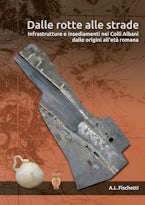Previously suspected on the basis of a tile stamped with the name and titles of the Emperor Nero found alongside other brick and tile in the ploughsoil, excavation of two tile kilns at Little London near Silchester, Hampshire confirmed production during the reign of Nero. In addition to the manufacture of standard bricks and roofing materials, the kilns produced the more specialist materials required for building bath houses. Work on the fabrics and distinctive, roller-stamped flue-tiles show that products reached a wide variety of destinations between Cirencester, some 100km to the north-west, and Chichester, on the south coast, though Silchester appears to have been the main market and is the only location where Nero-stamped tile has so far been found. A suggestion is made linking the stamped tile to the visit to Britain by the emperor’s trusted freedman, Polyclitus in the aftermath of the Boudican revolt. An unexpected discovery was the ancillary production from at least three pottery kilns of a wide range of pre-Flavian domestic wares, so far only identified in Silchester and its environs. Alongside the publication of the kilns there are illustrated catalogues of the complete range of brick and tile types produced as well as of the pottery. Other reports include analysis of the fuels used and a suite of radiocarbon dates which support the pottery evidence for production ceasing in the early Flavian period. Analysis of the numerous animal foot-impressions on the bricks presents one aspect of the environment of the kilns.
Preface
Acknowledgements
CHAPTER 1. INTRODUCTION (Michael Fulford)
CHAPTER 2. THE GEOPHYSICAL SURVEY (Neil Linford, Paul Linford and Andrew Payne)
CHAPTER 3. THE EXCAVATIONS (Nicholas Pankhurst and Daniel Wheeler with Michael Fulford)
CHAPTER 4. THE POTTERY (Jane Timby with Joanna Bird and Roger Tomlin)
CHAPTER 5. THE CERAMIC BUILDING MATERIAL (Sara Machin with Michael Fulford)
CHAPTER 6. WOOD CHARCOAL ANALYSIS: EVIDENCE FOR SITE ECONOMY AND ENVIRONMENT (Catherine Barnett)
CHAPTER 7. THE CHARRED PLANT REMAINS (Lisa Lodwick)
CHAPTER 8. LITTLE LONDON AND SILCHESTER INSULA IX: RADIOCARBON DATING AND CHRONOLOGICAL MODELLING (Derek Hamilton)
CHAPTER 9. ARCHAEOMAGNETIC INVESTIGATION OF TWO FIRED FEATURES AT LITTLE LONDON (David P. Greenwood, Sam E. Harris and Catherine M. Batt)
CHAPTER 10. CONCLUDING DISCUSSION (Michael Fulford)
THE APPENDICES:
APPENDIX 1. THE NERO TILE-STAMPS FROM LITTLE LONDON AND SILCHESTER (Peter Warry)
APPENDIX 2. OTHER FINDS (Michael Fulford and Nina Crummy)
APPENDIX 3. AGE OF ROUNDWOOD WHEN CUT (Catherine Barnett)
APPENDIX 4. CALIBRATED AGE RANGES USING THE UK ARCHAEOMAGNETIC CALIBRATED CURVE (David P. Greenwood, Sam E. Harris and Catherine M. Batt)
APPENDIX 5. AN INTRODUCTION TO ARCHAEOMAGNETIC DATING (David P. Greenwood, Sam E. Harris and Catherine M. Batt)











